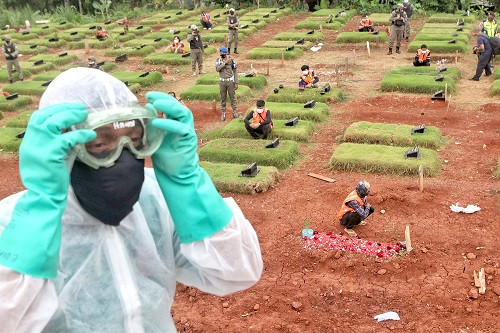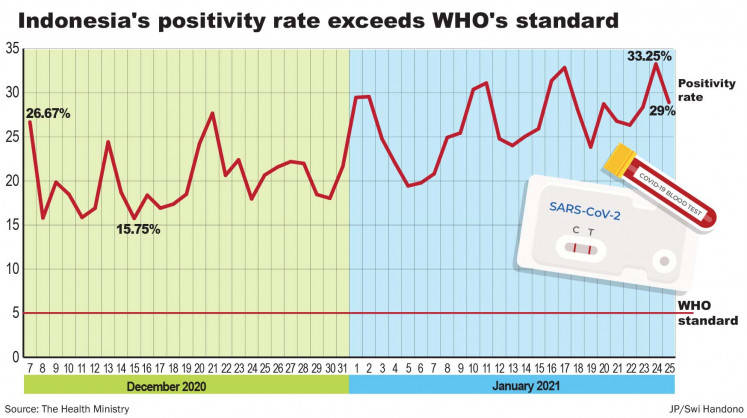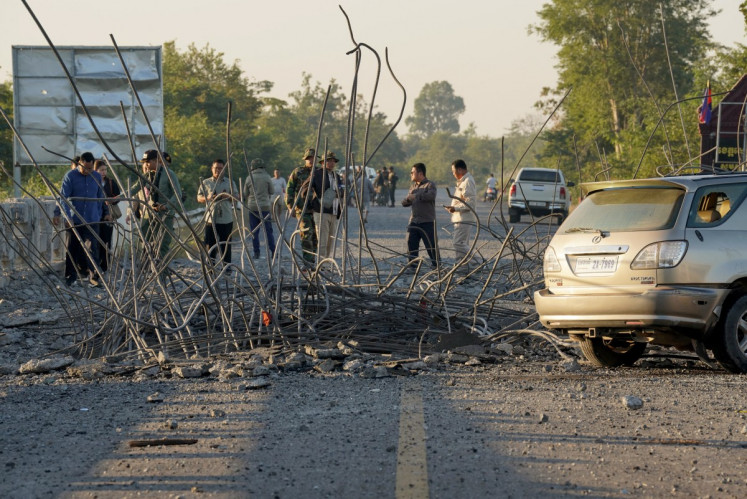Popular Reads
Top Results
Can't find what you're looking for?
View all search resultsPopular Reads
Top Results
Can't find what you're looking for?
View all search results‘Wrong’ strategy brings RI closer to 1 million cases
Patients' families struggle to book hospital beds, ventilators
Change text size
Gift Premium Articles
to Anyone
I
ndonesia is approaching the 1 million confirmed COVID-19 cases mark as the country suffers from “wrong” testing, tracing and isolating strategies, as well as a surge in hospitalizations.
The country logged 9,994 new confirmed cases and 297 new deaths on Monday, bringing the total tally to 999,256 cases and 28,132 deaths. According to the official count, there are now over 161,000 active cases in the country
However, epidemiologists have said that the country may have reached the 1-million milestone long before the government updated its official count.
“We’re only testing suspected cases with symptoms; many cases may have gone undetected,” said Padjadjaran University (Unpad) epidemiologist Panji Fortuna Hadisoemarto.
“There’s also the late reporting of cases […] because results are released the day after [tests are taken] or even the next week.”
Read also: For some patients, COVID-19 treatment strains both health and finances
President Joko “Jokowi” Widodo, however, expressed his gratitude on Monday that Indonesia “is among the countries that have been able to handle both [the health and economic] crises well”.
The President even said earlier this month that Indonesia was “lucky” that it did not have to impose a lockdown to curb the spread of the virus.
“Other countries in Europe had to impose lockdowns not just for a month or two, but for three months,” Jokowi said.
COVID-19 patients have reported difficulties in securing hospital beds and ventilators as most hospitals are at capacity, forcing them to run to volunteer group LaporCOVID-19 (Report COVID-19) to find proper treatment.
The group received a report earlier this month that a family member of a COVID-19 patient was looking for a ventilator on their own. According to the report, a private hospital treating the patient had run out of ventilators for COVID-19 patients.
The family reportedly had to rent a ventilator for Rp 30 million (US$2,134) per month and buy medication worth Rp 229 million. Despite the effort, the patient passed away, LaporCOVID-19 said.
Last week, a COVID-19 patient also died in South Tangerang, Banten, after spending two days trying to secure a hospital bed.
About 82 percent of Jakarta’s 534 intensive care unit (ICU) beds with ventilators are occupied by, according to the city’s data on Monday.
The Health Ministry reported on Saturday that Jakarta was among the regions with a bed occupancy rate that is higher than the safe rate of 60 percent. The others are Yogyakarta with 84 percent, Banten (78 percent) and West Java (72 percent).
However, LaporCOVID-19 previously slammed the disparities between authorities’ data and the real conditions on the ground, which was admitted recently by Health Minister Budi Gunadi Sadikin.
Read also: Private vaccination talks could spell bad news
One month into his appointment as a Cabinet minister, the former banker repeatedly brought up data issues in the country’s epidemic response. These issues had hindered the general public from accessing data on available beds for COVID-19 patients, forcing some lawmakers to reach out to the ministry’s director general for health services to be admitted into hospitals.
Budi added that such issues had also hampered testing, tracing and isolating efforts, which are deemed the most important measures to contain the outbreak. The confusion with the testing data system had led to delayed test results for up to a week when they should have been released within a day.
It has also caused data disputes between laboratories, as well as between local administrations and the central government, as highlighted by LaporCOVID-19.
The minister also recently conceded that the government had been testing the “wrong way”, citing himself as an example as he had to be tested prior to every meeting with President Jokowi.
"It shouldn't be like that. They should test people for epidemiological purposes [...] instead of private matters. The ones who should take the test are suspected cases, not people who want to go [on holiday or meetings]," Budi said during a virtual discussion last week.
“If this continues to be the case, when we finally meet five times the WHO’s [World Health Organization] standard of one test per 1,000 population per week, it will be useless because it's not for epidemiology," he went on to say.
Indonesia's positivity rate (JP/Swi Handono)Since the start of this year, Indonesia’s daily testing numbers have hovered between 24,000 and 50,000 people, with an average of 41,000 people tested last week. Health authorities recorded an average positivity rate of 27 percent last week, almost six times the ideal rate set by the WHO.
More than 84,000 suspected patients have yet to be tested or are still waiting for their results.
Meanwhile, the number of contacts traced ranged between two and four, as opposed to the international best practice of 30 contacts per case. Budi said each contact tracing effort could take more than a week as health personnel still do the process manually.
The minister added that he was still receiving suggestions to improve testing, tracing and isolation efforts, as he had been “busy with vaccination drives and surging hospitalizations”.
Unpad’s Panji said every epidemiologist had warned the government about the lack of testing and tracing in the country.
“Handling [vaccination and hospital beds] will be extremely draining […] They should fix [all the problems] at the same time,” he said.
Read also: Government extends newest curbs as COVID-19 tally nears 1 million-mark
He added that the only option the government had was to impose strict restrictions while upscaling testing and tracing efforts, as well as adding more hospital beds. Otherwise, a surge in cases would occur beyond the country’s healthcare system’s capacity, Panji went on to say.
Laura Navika Yamani, an epidemiologist with Airlangga University, said the currently imposed public activity restrictions (PPKM) were too flexible and provided many loopholes.
While urging the government to do better in testing, tracing and isolating suspected cases, she said authorities must provide assistance to people in self-isolation, so they would not fear that they could not earn a living for their family.











